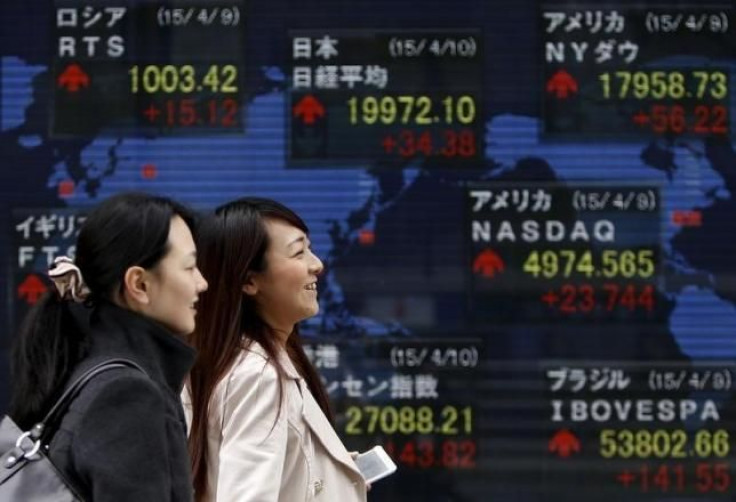Asia Shares Rise As China Steps Up Support For Economy

Asian shares rose on Monday as investors cheered China's latest cut to interest rates to bolster its flagging economy and after Wall Street rallied on a robust headline reading for U.S. employment.
China cut interest rates for the third time in six months on Sunday, and analysts predicted policymakers would relax reserve requirements and cut rates again in the coming months.
MSCI's broadest index of Asia-Pacific shares outside Japan was up 0.3 percent, moving away from a one-month low touched on Friday. Japan's Nikkei share average added 1.3 percent, also moving away from last week's one-month low.
Chinese shares erased earlier losses and were solidly higher. The CSI300 index of the largest listed companies in Shanghai and Shenzhen was up 1 percent, while the Shanghai Composite Index was up 1.2 percent.
The People's Bank of China cut its benchmark one-year lending rate by 25 basis points to 5.1 percent from Monday, and its benchmark deposit rate by the same amount to 2.25 percent.
"The timing of the rate cut is well within expectations while the depth of the cut is smaller than many had expected," said Zhang Chen, analyst at Shanghai-based hedge fund manger Hongyi Investment.
The easing followed Chinese inflation figures on Saturday that added to concerns about deflationary pressures.
On Friday, all three major U.S. stock indexes posted gains of over 1 percent, after U.S. Labor Department data showed nonfarm payrolls increased 223,000 last month, while the unemployment rate dropped to a near seven-year low of 5.4 percent.
The April jobs figures were seen to put the Fed on track for a rate increase as early as September, a Reuters poll found.
But U.S. short-term interest-rate futures implied traders don't expect a Fed rate hike until December at the earliest, based on CME FedWatch, as some people focused on the fact that the previous month's figures were revised to show a gain of 85,000 jobs instead of the 126,000 previously reported.
"Although April data alone does not guarantee that there won't be a U.S. rate hike sooner than expected in the coming months, there is a sense of relief for now," said Hiroyuki Nakai, chief strategist at Tokai Tokyo Research Center.
The mixed report helped lift U.S. Treasury yields. The yield on the benchmark 10-year note stood at 2.138 percent in Asian trade, compared to its U.S. close of 2.150 percent on Friday.
The higher yields gave some support to the dollar, which began the week in its recent ranges. The dollar index, which tracks the U.S. unit against a basket of six major rivals, added 0.3 percent to 95.108. The dollar was nearly flat on the day against the yen at 119.87, while the euro sagged about 0.4 percent to $1.1155.
The euro was under pressure after German Chancellor Angela Merkel's conservatives suffered an election defeat. The Eurosceptic Alternative for Germany (AfD) party was set to win seats in a fifth regional parliament on Sunday in an election in the city-state of Bremen.
Ongoing concerns about Greece's financial woes as well as disappointing German trade data also undermined the euro.
Later on Monday, the Eurogroup of euro zone finance ministers will meet, and Greece's government was hopeful that they will note progress on Athens' talks with lenders. The ministers have ruled out unlocking aid for Greece at the meeting, saying that too many issues with the debt-laden country remain unresolved.
The pound edged down about 0.2 percent to $1.5420, after it notched a 10-week high of $1.5523 on Friday against the greenback, after a surprise election victory by Conservatives.
Newly re-elected British Prime Minister David Cameron on Sunday ruled out giving Scotland another independence referendum despite gains by Scottish nationalists in a UK-wide election.
Oil got off to a lackluster start, with Brent LCOc1 unchanged on the day at $65.39 a barrel after it posted its first weekly loss in a month on Friday as the market fretted again about global oversupply. U.S. crude CLc1 was down about 0.2 percent at $59.29 after rising for an eighth straight week following the U.S. jobs report.
© Copyright IBTimes 2024. All rights reserved.











